Key takeaways:
- Plaque build-up, caused by bacteria from sugary and starchy foods, can lead to serious dental issues if neglected.
- Maintaining good dental hygiene is crucial for overall health, as neglect can lead to painful issues and increased dental bills.
- Professional dental cleanings are essential for removing plaque and tartar, improving oral hygiene, and reinforcing proper dental care techniques.
- Monitoring plaque levels through tools like disclosing tablets or apps can enhance oral health and foster consistency in dental routines.
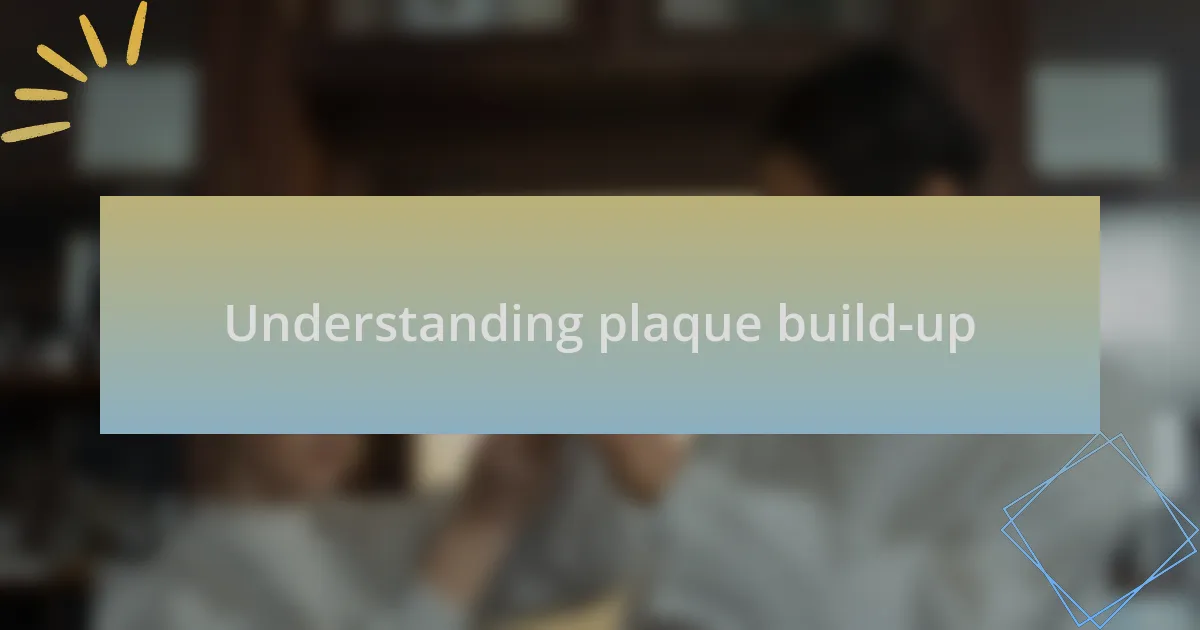
Understanding plaque build-up
Plaque build-up is essentially a sticky layer of bacteria that forms on our teeth when we consume sugary or starchy foods. I remember the first time my dentist explained it to me. I thought, “Isn’t that just a bit of food?” But, as I learned, it’s more than just a nuisance; it can lead to serious dental issues if not addressed promptly.
Have you ever felt that annoying roughness on your teeth after skipping out on brushing? That’s plaque calling out for your attention! With my own experience, it hit me how plaque doesn’t just vanish on its own. It can harden into tartar if left untreated, which means a professional cleaning is usually necessary, and honestly, who wants to deal with that?
When I first started focusing on my oral hygiene, I quickly realized how easy it is to overlook plaque. I found that these little habits can make a big difference: regular brushing, flossing, and the occasional mouthwash. Have you considered how your daily routine affects plaque? It’s a small adjustment that can lead to lasting benefits for your dental health.

Importance of dental hygiene
Maintaining good dental hygiene is essential not just for a bright smile but for overall health. I can still remember when a small cavity turned into a lesson I won’t ever forget. It was a painful reminder of how neglecting routine care can escalate into bigger issues. Have you ever found yourself cringing at a dental bill? That’s a real wake-up call.
Think about this: every time you skip brushing or flossing, you’re giving plaque the opportunity to thrive. I used to think, “It’s just one night,” but missing even one evening of oral care can lead to plaque buildup that creates long-term damage. The journey to better hygiene starts with those simple, daily habits. What would you do if you could prevent future dental challenges just by being a little more diligent?
Healthy teeth contribute to overall well-being, affecting everything from your confidence to your ability to chew properly. I once had a friend who ignored dental hygiene, and over time, it impacted his diet and social life. When you realize that taking care of your teeth can enhance your daytime interactions, it definitely shifts your perspective. Don’t you want to enjoy a pain-free, confident smile?
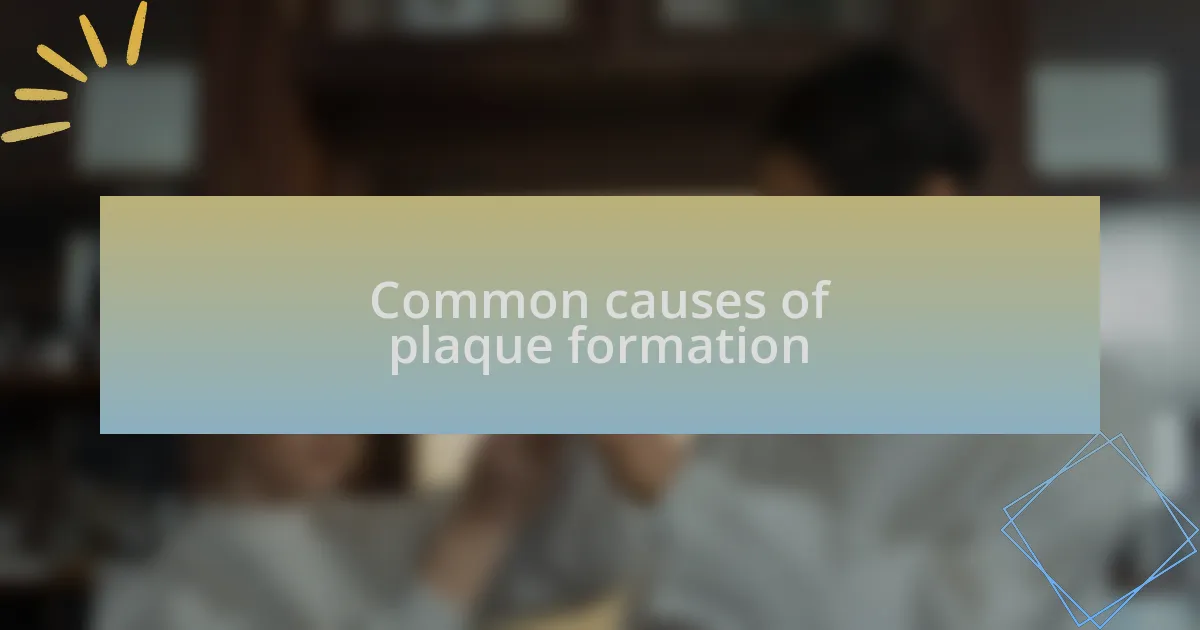
Common causes of plaque formation
Plaque formation is primarily caused by the accumulation of bacteria in the mouth. I remember a time when I neglected my oral care, and it was eye-opening to discover just how quickly bacteria can multiply. One missed brushing session led to a sticky film on my teeth that I couldn’t shake off without proper cleaning. Have you ever wondered how quickly plaque can build up after just one day of neglect? It’s alarming how it sneaks up on you.
Another common cause is a diet high in sugars and carbohydrates. I once indulged in sweet snacks without thinking about their effects on my teeth, and I learned the hard way how crucial it is to monitor what we eat. Eating sugary foods creates a perfect breeding ground for bacteria, leading to plaque buildup. It’s worth considering how your food choices reflect on your dental health, don’t you think?
Finally, inadequate brushing and flossing techniques significantly contribute to plaque formation. There were moments when I brushed my teeth hurriedly, convincing myself it was enough. But I soon realized that merely going through the motions wasn’t effective; technique matters. Have you ever taken a moment to reflect on whether your brushing style is really doing justice to your dental care? It’s essential to be mindful of how we clean our teeth to truly combat plaque buildup.
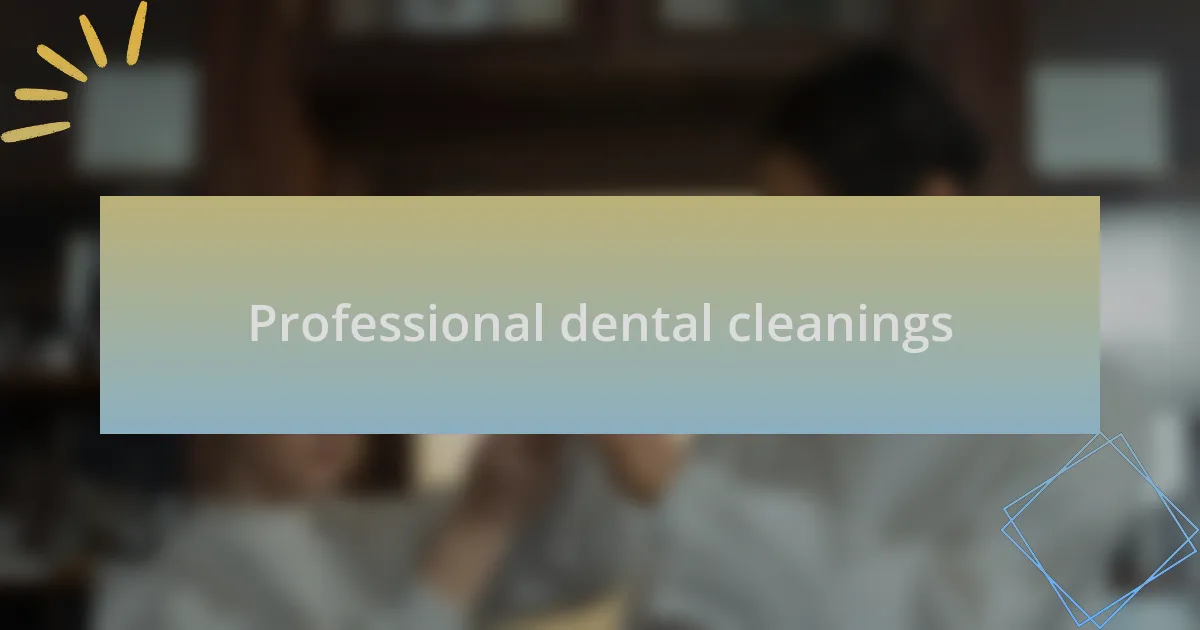
Professional dental cleanings
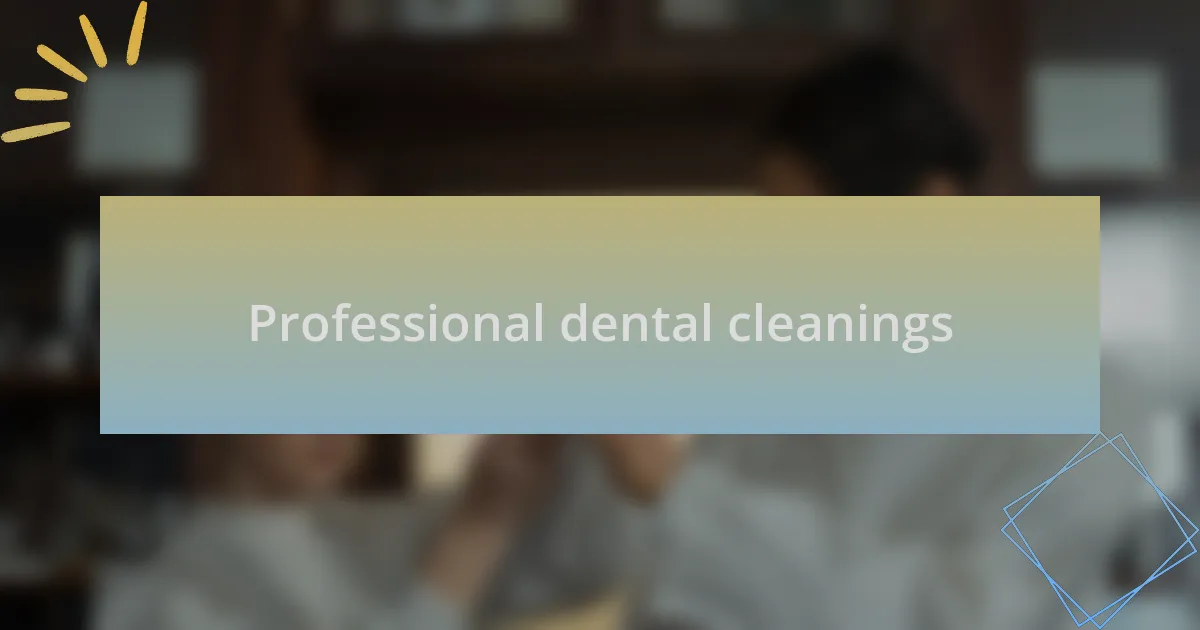
Professional dental cleanings
When I first visited the dentist for a professional cleaning, I didn’t quite understand its significance. As I sat in the chair, feeling a bit anxious, I was amazed at how much plaque and tartar were removed in such a short time. That experience opened my eyes to how regular cleanings not only improve my oral hygiene but also provide insights into my overall health.
Each time I go for a cleaning, it feels like a fresh start for my mouth. The dental hygienist takes such care, and I can feel the difference immediately. I often leave with a sense of accomplishment, knowing I’ve taken a proactive step in preventing dental issues. Don’t you think it’s comforting to know that dedicated professionals are helping to keep our smiles bright?
Incorporating professional cleanings into my routine has not only helped reduce plaque but also encourages me to maintain better home care. I remember the last time I was reminded of the proper flossing technique, which I hadn’t been doing correctly. It’s fascinating how a little guidance can lead to substantial improvements in my daily habits. Have you considered how often a professional cleaning could elevate your dental health?
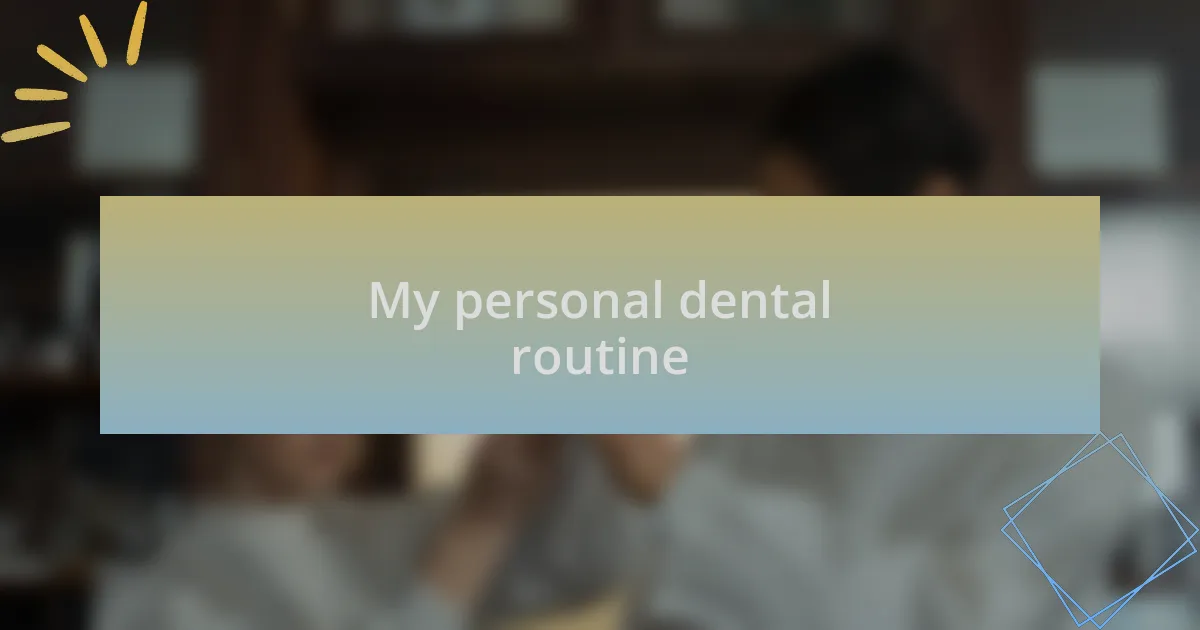
My personal dental routine
My daily dental routine begins first thing in the morning. I always brush my teeth for two full minutes; I use an electric toothbrush because I find it helps me be more effective at removing plaque. There’s something almost meditative about that routine—it’s my moment of self-care before the day begins.
Flossing is my secret weapon against plaque build-up. I recall a time when I neglected to floss regularly, and I could feel the difference. Now, I see it as essential; it just takes a minute but makes such a significant impact. I often think, “Isn’t it worth those 60 seconds for healthier gums?”
In the evening, I don’t skip mouthwash—it’s the cherry on top of my dental care. I love the refreshing feeling it leaves behind, making me feel like I’m sealing in all my hard work throughout the day. Have you considered how a simple rinse can enhance your routine?
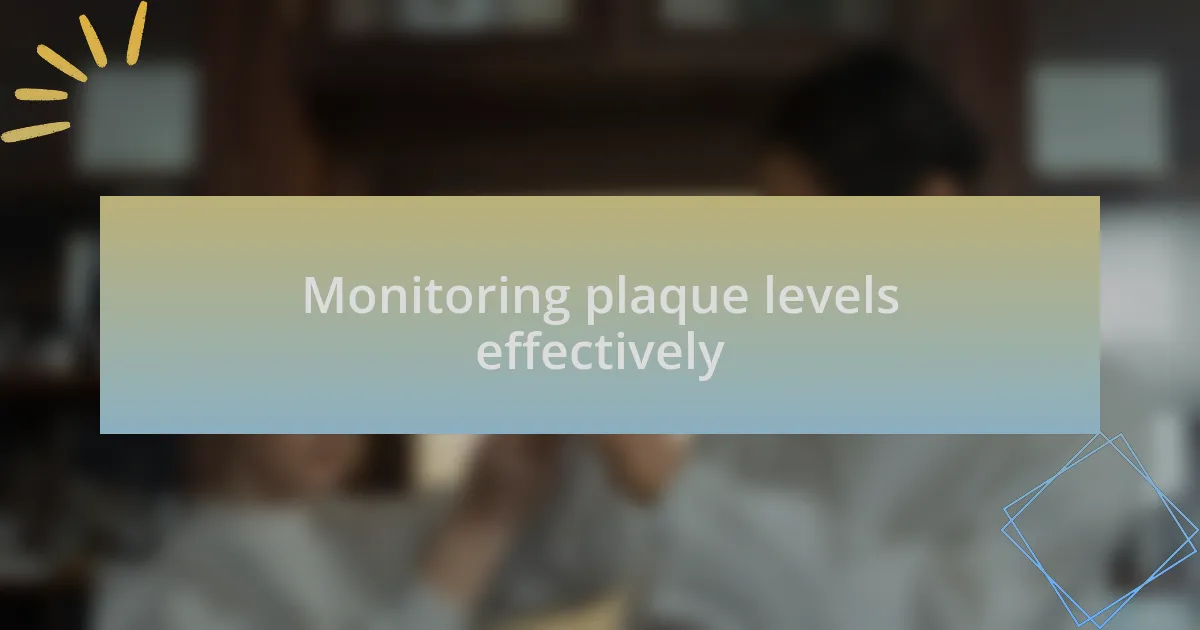
Monitoring plaque levels effectively
Monitoring plaque levels is crucial for maintaining good oral health. I’ve discovered that regular check-ins on plaque build-up can save me from bigger issues down the line. For instance, I’ve started using disclosing tablets that temporarily stain plaque, making it visible while brushing. This simple tool has turned plaque detection into a surprisingly engaging part of my routine.
From my experience, I find that keeping a dental diary helps me track my brushing and flossing habits. Each time I note a lapse or a surge in plaque, it serves as a reminder that consistent care is key. It’s often surprising how just a few missed sessions can result in noticeable plaque build-up; have you ever had that ‘oops’ moment?
One technique I’ve found effective is using an app that tracks my oral hygiene. The prompts and reminders make me more accountable, almost like having a dental coach in my pocket. Every prompt feels less like a chore and more like a friendly nudge toward better health. I can’t stress enough how beneficial it is to have those reminders; have you considered a digital approach to your dental monitoring?